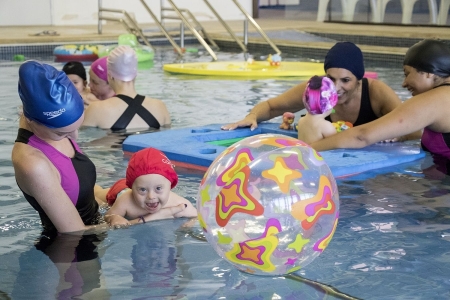05 Junho de 2018
Voluntary project helps babies with neuromotor disorders
In cap and swimwear, the little kids enter the pool accompanied by students of Physiotherapy of Univates. With joy and curiosity, five babies with neuromotor disorders prove that learning can be fun. And they are not the only ones who learn: the academics too, who in the classroom and voluntarily, had the initiative to practice water activities with the goal of encouraging children to make different movements.
The idea of working with pediatric aquatic therapy arose in the course Neurological Physiotherapy II, last semester.
The student Vanessa Hendges says that some mothers who accompanied their children in the activities carried out in the course had the desire that their children could also practice in the pool. "As other colleagues and I, at the time students of the course, already had this desire to do a voluntary work with infants in the pool, the idea of the voluntary project of hydrotherapy in pediatrics arose", she says.
As the babies entertain themselves in the water or on the outside, parents watch the merriment carefully. Among those present is Rafael Henrique Grave, the father of Nicolas Henrique Grave, who is one year and three months old. The little one, accompanied also of his grandmother Gertrudes, comes from Teutônia to participate in the activities. "He likes it very much. From the first time he had contact with the water, he showed acceptance", says his father. Nicolas has Down Syndrome and a busy schedule of tasks ranging from follow-up at home and at Apae to appointments at Univates.
“Coming to Univates made us calmer. We are very lucky to have a structure like this, in addition to all the care shown by professionals. It seems that they were born for this, they are dedicated and trained”, says Rafael Henrique Grave, father of Nicolas.
Rafael also emphasizes that the meetings allow the exchange of experiences among the parents in relation to their children.
The activities began early in April of this year and offer a different experience for the training of academics. "In addition to acquiring new experiences and learning in practice how to become a future physiotherapist, we learn the most important thing, that is to look at each child as if they were unique", says Vanessa. The student of Physiotherapy explains that the activities carried out with infants in the water "improve motor development and cardiorespiratory capacity, inhibit abnormal patterns of posture and movement, improve motor coordination, strengthen muscles, in addition to promoting sociability and being pleasurable", she says.
Under the supervision and guidance of Professor Magali Quevedo Grave, the exercises are carried out by volunteer students of the Physiotherapy program who have taken or are studying the subjects of Hydrokinesiotherapy and Neurological Physiotherapy II. The project was conceived and is being run by the students Vanessa Hendges, Taís Battisti, Laura Lopes and Mariana Arenhart, and also has the assistance of the trainee Daniele Krützmann. The group stresses that it needs more volunteers, which will allow more babies to be cared for. Those interested should send an e-mail to vanessa.hendges@universo.univates.br.
Learn more
Neuromotor disorders are changes related to muscle tone that lead to delayed acquisition of motor skills such as sitting, crawling and walking. These alterations can originate from diagnoses such as Down Syndrome, cerebral palsy and obstetric brachial plexus injury, for example.
